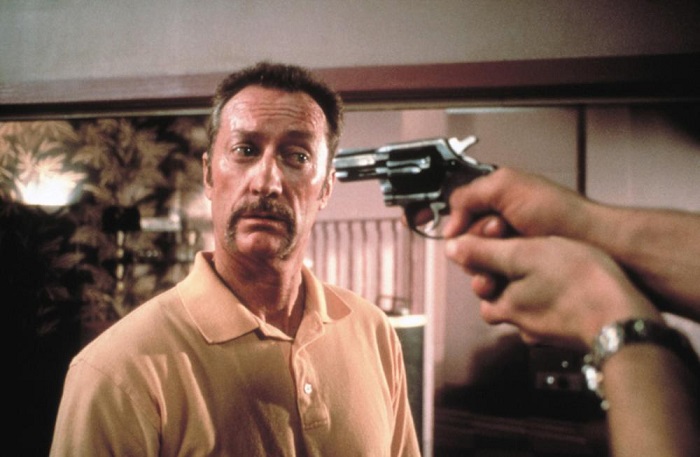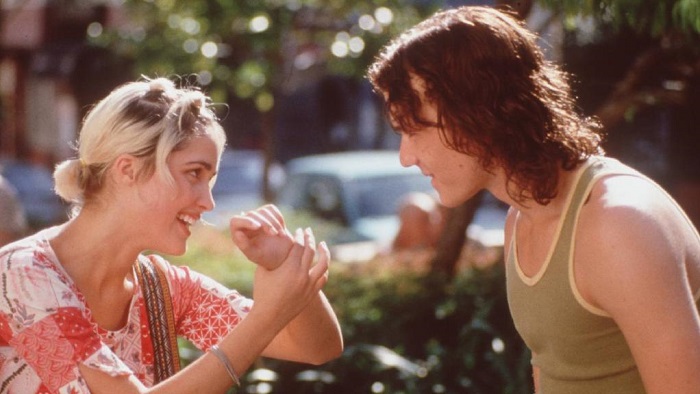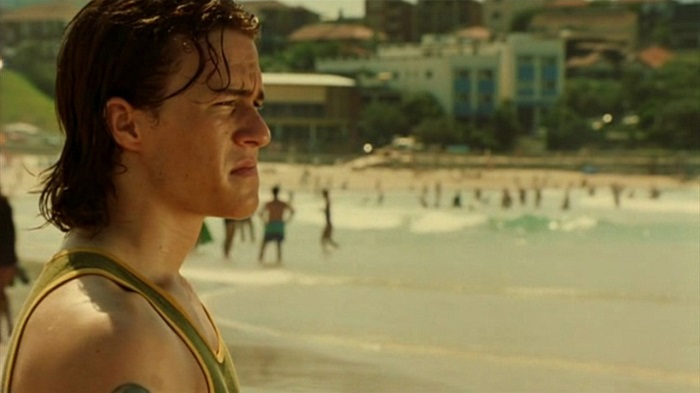In 1999, Heath Ledger arrived on cinemas screens as a fully formed film star with a one-two punch of stellar films. His laid-back looks and easy-going ocker attitude made him an instant icon, with his heartthrob status well and truly confirmed by his romantic role as Patrick Verona in Ten Things I Hate About You, another addition to the nineties boom of teen-takes on Shakespeare. But closer to home, that same laid-back nature and all too easy going attitude worked to satirise the Aussie gangster in Gregor Jordan’s iconic debut Two Hands.
Ledger plays Jimmy, an eager bouncer for a Kings Cross strip club, looking to make a life for himself amidst a myriad of nefarious thugs and haphazard gangsters. Before too long, Bryan Brown’s handlebar moustache-wearing mob boss Pando slides on up and offers Jimmy a simple job of delivering $10k to a woman in Bondi. Seeing an easy-in with the crime world, Jimmy jumps at the chance and on a sunny summer day, heads to her house.
As Jimmy knocks on the door, the woman inside sputters and spurts her last in a haze of cigarette smoke. With her dead on the floor, Jimmy presumes no one is home, and heads down to the packed Bondi Beach to take a dip, burying the $10k in the sand under his clothes. It’s the first major idiotic move Jimmy makes – well, besides agreeing to take a job for a bunch of thugs – as omnipresent street kids, Pete (Evan Sheaves) and Helen (Mariel McClorey), notice the loot he’s hidden and bring about a world of pain for Jimmy by nicking it and scarpering off to their local deli to spend up big on sweets and treats.
Jimmy immediately realises the pressure he’s under, and thinking he’s doing the right thing, gives Pando a courtesy call to let him know the dosh has gone missing. Naturally, Pando is pissed and flips a lid. Looking for a way to come up with $10k overnight, Jimmy cracks a plan to rob a bank with some family friends the following day, an equally idiotic plan that ends exactly how you’d think it would.
As this violent chaos is unfurling, Jimmy meets Alex (Rose Byrne), the sister to his bouncer co-worker, and eventual romantic interest. Look, there are many things that make Two Hands an iconic, classic Aussie film, from the masterful use of Powderfinger music, to the black-comedic streak that pumps through its veins, to Bryan Brown’s Pando teaching his kids how to make origami, but it’s the powerful chemistry that Heath Ledger and Rose Byrne share with each other here.
In one stand-still moment of pure nineties brilliance, you see Ledger’s Jimmy fall head over heels completely for Alex. After chatting about Alex’s photography, Jimmy asks to take a photo of her. Reluctantly, she hands her camera over, and as Jimmy – adorned in an olive tank top, rip apart sweatpants, and with worn down pluggers on his feet – looks through the lens, he’s immediately awestruck by her beauty. Alongside Jimmy, we can’t help but fall head over heels for Rose Byrne, her screen presence here promising a career of top notch role after top notch role.
These romantic moments flitter throughout Two Hands like a welcome centerpoint that works to balance the frequent absurdity of the film. Gregor Jordan’s script suffers slightly from a frequent nineties trait that carried on from the intertwined hangover of Pulp Fiction/Short Cuts: overlapping narratives and character arcs that bend and weave upon each other, eventually colliding into one another in a catastrophic manner. The above plot rundown barely scrapes the surface of the madcap happenings within the film, with everything from stupid henchmen washing bullets in their laundry, to a meddling ghost brother causing Jimmy to have freakouts on midnight trains.
If there’s a major complaint about Two Hands, it’s the presence of Jimmy’s dead brother (Steve Vidler) as an ominous figure watching his brother follow in his footsteps. Vidler’s performance is fine, providing a suitably gruff vocal presence to much of the film, one that’s only amplified by the impressive sterling nineties opening credits sequence, but ultimately has little consequence or purpose to the grander narrative at large.
Dead brother aside, Jordan’s script is acidic and biting, giving each actor a meaty chunk to chew on and create memorable characters with. Each scene is peppered with a gradual rollercoaster like tension that is often broken apart by a welcome joke or burst of comedy.
Take the central bank robbery and its subsequent fallout. This is a sequence that proves the height of absent minded criminality with the planning taking place in the family living room with the kids rolling around on the floor in diapers. Tatted up to the max, Steve Le Marquand’s Wozza brings Jimmy into the fold with a hopeless plan of taking on a local bank. Wozza and Jimmy burst into the bank, with Jimmy keeping the customers at bay with a shotgun. Wozza pilfers a couple of bags of cash from the back of the bank, running to escape with a heroic leap over the counter, catching his foot and knocking himself out cold.
This uproarious and ridiculous moment elevates a routine bank robbery into a masterful moment of Aussie cinema. Our fascination with crims and crooks is omnipresent, with the nineties and early oughts delivering a smattering of endearing, yet dimwitted crooks, in a variety of exciting films like Idiot Box and Dirty Deeds. Two Hands set the benchmark of how to straddle the comedic line of extreme violence and out there comedy – these are drongos to be laughed at, all the while celebrating their stupidity.
As Jimmy, Wozza, and getaway driver Craig (Kieran Darcy-Smith) try to escape the failed robbery, Craig cops a bullet to the head from the cops. Back at home, with Susie Porter’s motherly Deirdre there to calm the situation, the group mourn the death of Craig, all the while the rambling kids play around with a shotgun and blast a hole in the ceiling.
If Two Hands was indicative of the intelligence level of Australian criminals, one has to wonder how they ever managed to stick around. As Gregor Jordan mentioned to Filmink:
Casting the role of Jimmy was always critical. When you’re presenting a character who basically does very stupid things, you have to have an actor who’s likeable. Otherwise everyone will just think he’s a fuckwit.
Arguably, Jordan applied that same logic to each actor, with the entire cast being made up of likeable figures.

Sure, Heath Ledger is stellar, but there’s a welcome warmth to the scenes between David Field’s Acko and Tom Long’s Wally. Two Hands is a great reminder of what a powerful, endearing presence Tom Long had on screen, and his partnership with David Field makes for an entertaining bond. Chuck in Bryan Brown’s acerbic Pando and you’ve got a villainous trio who show why someone like Jimmy would want to work with them.
From a modern perspective, it’s hard to reconcile with just how dominant Mark Brandon ‘Chopper’ Read was in the nineties. Brown’s Pando is clearly a Chopper-esque figure, with his handlebar moustache, his lackadaisical approach to problems and life, as well as his high pitch tone when talking to kids that’s mirrored by his angry ocker rage in the face of adversity, all leading towards a character crafted in the shadow of a titan superstar criminal.
As with many Aussie crime films, there’s little active condemnation of the gangsters here, with their violence against others left to hang them out dry. They’re usually ripping off themselves or heavily insured banks, making their illegal exploits feel decidedly non-personal. Just like Andrew Dominik’s Chopper, which would arrive as the perfect encore to Two Hands a year later, there’s an appreciation that many of these criminals were born into this life with society as a whole giving little to no avenue to further themselves as people.
The theme of what goes around, comes around, is strong within Two Hands, something that is highlighted with the moments of collateral damage that accentuate the villains, and highlight the take-no-bullshit stance of the average Aussie. A particular shocking moment of Pete being hit by a car rings loud throughout the film, highlighting Acko as the only true evil figure who eventually gets his comeuppance thanks to Helen in the momentous climax. Elsewhere, a saxophone playing busker gets his revenge on a snitch who steals some coins to rat on Jimmy’s location. An omnipresent graffitied $100 note flits through the plot as a continuous reminder that violence awaits all who engage with it eagerly.
There’s an adjacent familiarity to these criminal characters, one that might highlight why these films resonate so strongly with Aussie viewers. Could it be that each turn of the screw in their own lives pulls them into a similar orbit as these characters? The path of Jimmy, a bloke enticed by opportunity and money, albeit one draped in criminality, feels all too relatable.
Two Hands cements its crims at home in suburbia, with the city as their playground, both of which are represented by Sydney and its outskirts perfectly. The Sydney monorail exists as cultural memory here, as does the vibrant nightlife of Kings Cross, replete with its unique faces and colourful lifestyle. This late nineties Sydney feels alive and vital, with Two Hands working as a wonderful time capsule of an era long gone, smothered by a decade of lock-out laws and cultural oppression.
Yet, there’s a timeless quality to Two Hands. Its shagginess is easy to overlook as the iconic riff of Belter by Powderfinger opens the film in a head banging manner, one that’s bookended with one of the most emotional climactic shootouts thanks to These Days. The sadness of the song, with Bernard Fanning’s mournful vocals, slams home the reality of the violence whirling within Jimmy’s world.
In many ways, Two Hands is a masterful machine that relies heavily on each part working in harmony. Remove one aspect, and it all crumbles apart like a teetering Jenga tower falling into a heap. Sure, Powderfinger’s songs help keep Two Hands alive in the minds of many, but it’s Heath Ledger and Rose Byrne’s chemistry and comfortable screen presence that is supported brilliantly by Gregor Jordan’s confident script and direction, of which is assisted by veteran Bryan Brown, and the cast of familiar Aussie actors, that make this an enduring Aussie classic.

Director: Gregor Jordan
Cast: Heath Ledger, Rose Byrne, Bryan Brown
Writer: Gregor Jordan



